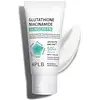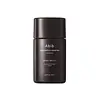What's inside
What's inside
 Key Ingredients
Key Ingredients

 Benefits
Benefits

 Concerns
Concerns

 Ingredients Side-by-side
Ingredients Side-by-side

Water
Skin ConditioningEthylhexyl Methoxycinnamate
UV AbsorberButylene Glycol
HumectantEthylhexyl Salicylate
UV AbsorberOctocrylene
UV AbsorberBis-Ethylhexyloxyphenol Methoxyphenyl Triazine
Skin ConditioningButyl Methoxydibenzoylmethane
UV AbsorberDipropylene Glycol
HumectantNiacinamide
SmoothingSqualane
EmollientC14-22 Alcohols
Emulsion Stabilising1,2-Hexanediol
Skin ConditioningPolyglyceryl-2 Stearate
EmulsifyingPropanediol
SolventHydroxyacetophenone
AntioxidantGlyceryl Stearate
EmollientStearyl Alcohol
EmollientC12-20 Alkyl Glucoside
EmulsifyingTromethamine
BufferingCentella Asiatica Extract
CleansingCarbomer
Emulsion StabilisingMelaleuca Alternifolia Leaf Extract
PerfumingHippophae Rhamnoides Fruit Extract
Skin ConditioningVitis Vinifera Fruit Extract
Skin ConditioningAcrylates/C10-30 Alkyl Acrylate Crosspolymer
Emulsion StabilisingUncaria Sinensis Extract
Skin ConditioningGlycerin
HumectantAdenosine
Skin ConditioningDisodium EDTA
Oryza Sativa Bran Extract
Skin ConditioningHydrogenated Phosphatidylcholine
EmulsifyingCaprylic/Capric Triglyceride
MaskingSodium Hyaluronate
HumectantGlucose
HumectantHydrolyzed Collagen
EmollientSucrose Stearate
EmollientGlutathione
Cyclodextrin
AbsorbentCetearyl Alcohol
EmollientCaprylyl Glycol
EmollientBeta-Glucan
Skin ConditioningCaprylhydroxamic Acid
Ethylhexylglycerin
Skin ConditioningAsiatic Acid
Skin ConditioningAsiaticoside
AntioxidantMadecassic Acid
Skin ConditioningMadecassoside
AntioxidantTropolone
Skin ConditioningHyaluronic Acid
HumectantPotassium Hyaluronate
Skin ConditioningWater, Ethylhexyl Methoxycinnamate, Butylene Glycol, Ethylhexyl Salicylate, Octocrylene, Bis-Ethylhexyloxyphenol Methoxyphenyl Triazine, Butyl Methoxydibenzoylmethane, Dipropylene Glycol, Niacinamide, Squalane, C14-22 Alcohols, 1,2-Hexanediol, Polyglyceryl-2 Stearate, Propanediol, Hydroxyacetophenone, Glyceryl Stearate, Stearyl Alcohol, C12-20 Alkyl Glucoside, Tromethamine, Centella Asiatica Extract, Carbomer, Melaleuca Alternifolia Leaf Extract, Hippophae Rhamnoides Fruit Extract, Vitis Vinifera Fruit Extract, Acrylates/C10-30 Alkyl Acrylate Crosspolymer, Uncaria Sinensis Extract, Glycerin, Adenosine, Disodium EDTA, Oryza Sativa Bran Extract, Hydrogenated Phosphatidylcholine, Caprylic/Capric Triglyceride, Sodium Hyaluronate, Glucose, Hydrolyzed Collagen, Sucrose Stearate, Glutathione, Cyclodextrin, Cetearyl Alcohol, Caprylyl Glycol, Beta-Glucan, Caprylhydroxamic Acid, Ethylhexylglycerin, Asiatic Acid, Asiaticoside, Madecassic Acid, Madecassoside, Tropolone, Hyaluronic Acid, Potassium Hyaluronate
Water
Skin ConditioningDibutyl Adipate
EmollientHouttuynia Cordata Extract
Skin ConditioningAlcohol
AntimicrobialCaprylyl Methicone
Skin ConditioningDiethylamino Hydroxybenzoyl Hexyl Benzoate
UV FilterBis-Ethylhexyloxyphenol Methoxyphenyl Triazine
Skin ConditioningPhenethyl Benzoate
EmollientPolymethylsilsesquioxane
Polysilicone-15
UV FilterMethylene Bis-Benzotriazolyl Tetramethylbutylphenol
UV FilterEthylhexyl Triazone
UV AbsorberHexyl Laurate
EmollientNiacinamide
SmoothingPolyglyceryl-6 Stearate
EmollientDiethylhexyl Butamido Triazone
UV AbsorberAspergillus Ferment
Skin ConditioningTriticum Aestivum Seed Extract
Perfuming1,2-Hexanediol
Skin ConditioningPentylene Glycol
Skin ConditioningC20-22 Alkyl Phosphate
EmulsifyingPanthenol
Skin ConditioningDecyl Glucoside
CleansingHydroxyacetophenone
AntioxidantTromethamine
BufferingEthylhexyl Olivate
Skin ConditioningPolyglyceryl-6 Behenate
Emulsion StabilisingSodium Acrylates Copolymer
Polyglyceryl-4 Oleate
EmulsifyingDipotassium Glycyrrhizate
HumectantAdenosine
Skin ConditioningGlycerin
HumectantSodium Phytate
Maltodextrin
AbsorbentLipase
Skin ConditioningProtease
ExfoliatingC20-22 Alcohols
Emulsion StabilisingXanthan Gum
EmulsifyingWater, Dibutyl Adipate, Houttuynia Cordata Extract, Alcohol, Caprylyl Methicone, Diethylamino Hydroxybenzoyl Hexyl Benzoate, Bis-Ethylhexyloxyphenol Methoxyphenyl Triazine, Phenethyl Benzoate, Polymethylsilsesquioxane, Polysilicone-15, Methylene Bis-Benzotriazolyl Tetramethylbutylphenol, Ethylhexyl Triazone, Hexyl Laurate, Niacinamide, Polyglyceryl-6 Stearate, Diethylhexyl Butamido Triazone, Aspergillus Ferment, Triticum Aestivum Seed Extract, 1,2-Hexanediol, Pentylene Glycol, C20-22 Alkyl Phosphate, Panthenol, Decyl Glucoside, Hydroxyacetophenone, Tromethamine, Ethylhexyl Olivate, Polyglyceryl-6 Behenate, Sodium Acrylates Copolymer, Polyglyceryl-4 Oleate, Dipotassium Glycyrrhizate, Adenosine, Glycerin, Sodium Phytate, Maltodextrin, Lipase, Protease, C20-22 Alcohols, Xanthan Gum
 Reviews
Reviews

Ingredients Explained
These ingredients are found in both products.
Ingredients higher up in an ingredient list are typically present in a larger amount.
1,2-Hexanediol is a synthetic liquid and another multi-functional powerhouse.
It is a:
- Humectant, drawing moisture into the skin
- Emollient, helping to soften skin
- Solvent, dispersing and stabilizing formulas
- Preservative booster, enhancing the antimicrobial activity of other preservatives
Adenosine is in every living organism. It is one of four components in nucleic acids that helps store our DNA.
Adenosine has many benefits when used. These benefits include hydrating the skin, smoothing skin, and reducing wrinkles. Once applied, adenosine increases collagen production. It also helps with improving firmness and tissue repair.
Studies have found adenosine may also help with wound healing.
In skincare products, Adenosine is usually derived from yeast.
Learn more about AdenosineYou might know this ingredient as Tinosorb S or Bemotrizinol. It is a UV filter that covers both UVA and UVB rays.
This ingredient has two peak UV absorption peaks ( 310 and 340 nm) and is able to absorb both UV-A and UV-B rays. This ingredient works by preventing UV rays from reaching and damaging your skin.
On top of that - it is highly photostable and helps prevent the photodegration of other sunscreen ingredients such as avobenzone.
Tinosorb S is allowed in the EU, Australia, and Asia. It is close to being approved by the FDA and we'll hopefully get this ingredient in the U.S. by late 2025.
Fun fact: Tinosorb S is the most effective UV absorber at maximum concentration (measured by SPF) permitted in the EU.
This ingredient is oil-soluble, so your oil-cleansers will take this right off at night.
Learn more about Bis-Ethylhexyloxyphenol Methoxyphenyl TriazineGlycerin is already naturally found in your skin. It helps moisturize and protect your skin.
A study from 2016 found glycerin to be more effective as a humectant than AHAs and hyaluronic acid.
As a humectant, it helps the skin stay hydrated by pulling moisture to your skin. The low molecular weight of glycerin allows it to pull moisture into the deeper layers of your skin.
Hydrated skin improves your skin barrier; Your skin barrier helps protect against irritants and bacteria.
Glycerin has also been found to have antimicrobial and antiviral properties. Due to these properties, glycerin is often used in wound and burn treatments.
In cosmetics, glycerin is usually derived from plants such as soybean or palm. However, it can also be sourced from animals, such as tallow or animal fat.
This ingredient is organic, colorless, odorless, and non-toxic.
Glycerin is the name for this ingredient in American English. British English uses Glycerol/Glycerine.
Learn more about GlycerinHydroxyacetophenone is antioxidant with skin conditioning and soothing properties. It also boosts the efficiency of preservatives.
This ingredient is not irritating or sensitizing.
Niacinamide is a multitasking form of vitamin B3 that strengthens the skin barrier, reduces pores and dark spots, regulates oil, and improves signs of aging.
And the best part? It's gentle and well-tolerated by most skin types, including sensitive and reactive skin.
You might have heard of "niacin flush", or the reddening of skin that causes itchiness. Niacinamide has not been found to cause this.
In very rare cases, some individuals may not be able to tolerate niacinamide at all or experience an allergic reaction to it.
If you are experiencing flaking, irritation, and dryness with this ingredient, be sure to double check all your products as this ingredient can be found in all categories of skincare.
When incorporating niacinamide into your routine, look out for concentration amounts. Typically, 5% niacinamide provides benefits such as fading dark spots. However, if you have sensitive skin, it is better to begin with a smaller concentration.
When you apply niacinamide to your skin, your body converts it into nicotinamide adenine dinucleotide (NAD). NAD is an essential coenzyme that is already found in your cells as "fuel" and powers countless biological processes.
In your skin, NAD helps repair cell damage, produce new healthy cells, support collagen production, strengthen the skin barrier, and fight environmental stressors (like UV and pollution).
Our natural NAD levels start to decline with age, leading to slower skin repair, visible aging, and a weaker skin barrier. By providing your skin niacinamide, you're recharging your skin's NAD levels. This leads to stronger, healthier, and younger looking skin.
Another name for vitamin B3 is nicotinamide. This vitamin is water-soluble and our bodies don't store it. We obtain Vitamin B3 from either food or skincare. Meat, fish, wheat, yeast, and leafy greens contain vitamin B3.
The type of niacinamide used in skincare is synthetically created.
Learn more about NiacinamideTromethamine helps balance the pH and improve the texture of a product. It is synthetically created.
As an emulsifier, Tromethamine prevents oil and water ingredients from separating. This helps stabilize the product and elongate a product's shelf life. Tromethamine also makes a product thicker.
Tromethamine helps balance the pH level of a product. Normal pH level of skin is slightly acidic (~4.75-5.5). The acidity of our skin is maintained by our glands and skin biome. Being slightly acidic allows our skin to create an "acid mantle". This acid mantle is a thin barrier that protects our skin from bacteria and contaminants.
Oral Tromethanmine is an anti-inflammatory drug but plays the role of masking, adding fragrance, and/or balancing pH in skincare.
1,3-Propanediol, 2-amino-2-(hydroxymethyl)-
Learn more about TromethamineWater. It's the most common cosmetic ingredient of all. You'll usually see it at the top of ingredient lists, meaning that it makes up the largest part of the product.
So why is it so popular? Water most often acts as a solvent - this means that it helps dissolve other ingredients into the formulation.
You'll also recognize water as that liquid we all need to stay alive. If you see this, drink a glass of water. Stay hydrated!
Learn more about Water